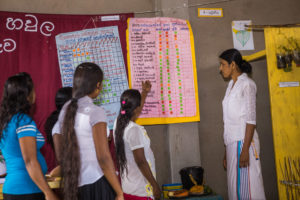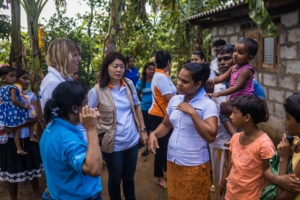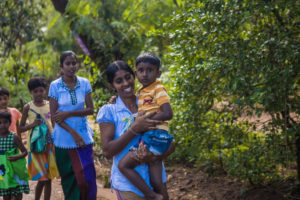How broader nutrition-based coordination tackles cultural taboos and empowers women in Sri Lanka
* Originally published by the UN Network for SUN From December 2018 to March 2020, the World Food Program (WFP), part of the UN [nutrition] Network (UNN) in Sri Lanka, and the United Nations Population Fund (UNFPA), joined forces to launch the Community Health Advanced…
* Originally published by the UN Network for SUN
From December 2018 to March 2020, the World Food Program (WFP), part of the UN [nutrition] Network (UNN) in Sri Lanka, and the United Nations Population Fund (UNFPA), joined forces to launch the Community Health Advanced through Nutrition and Gender Equality project (CHANGE). The program aims to achieve gender equality and women’s empowerment through improved nutrition, food security, sexual and reproductive health, and access to health services. Six districts with a total of 8,000 participants took part, with funding by the Danish Government.
Integration across sectors was central to the project design. “This was the first time the issues were connected in a way that was evident to participants,” explains Sarah Soysa, National Programme Analyst for UNFPA. “In the past, nutrition was dealt separately from gender-based violence, Sexual and Reproductive Health, etc. For example, the handbook changed for Mother Support Groups (MSGs), one of the main components of the program. Training changed as well to make the explicit connection between how poor nutrition could affect a pregnancy; how gender-based violence could affect someone’s mental health.”
Lakmini Perera, a gender programme officer at WFP, agrees that one of the project’s main achievements was collaboration. “Materials, partners and conversations around gender [were cross-pollinated]. It was also new for the government to collaborate across sectors – gender, health, and nutrition.” This kind of model presents opportunities for a multiplier effect.
Innovative aspects of this program abound. A mobile phone application (app) was developed to track progress. Videos were made for 9th graders, designed to be shown to both boys and girls during a class on life skills. Finally, cooking demonstrations were held with an added twist, (described below).
A new app for Mother Support Groups
Originally, these groups were formed through a collaborative project between WFP and UNFPA to raise awareness on nutrition, with the potential to address more sensitive issues like sexual and reproductive health and gender inequities. As many as 1250 MSGs meet regularly in six districts, and the programme touched on many of these during ‘Training of Trainers’ sessions that targeted medical officers and other community volunteers in 78 Ministry of Health areas.
To keep track of the frequency of group meetings, as well as who is leading the discussion and what topics they covered, an app was developed. “Note-taking on meetings was not systematic,” Sarah reflects. “The app acts as a monitoring tool to put everything in one place. Pictures and stories can be uploaded. It helps groups connect with other groups. On a national level, program managers can access data, see the progress in topics the groups.”
Still in its infancy, trainings on how to use the app had begun just before the COVID-19 pandemic shut the country down.
Videos model new gender norms
Lakmini anticipates that the most valuable tools for participants in the program will be the video series for schools, developed for the CHANGE programme. Two social behaviour change communication (SBCC) videos have been produced in the two local languages. As this goes to press, the videos are in the final stages of production.
The series is based on life skills and incorporates nutrition as well as sexual and reproductive health, addressing topics such as puberty, menstruation and positive body image, to name a few. “In the videos, we model a boy talking to the girl about some of these taboo subjects, to normalize these kinds of discussions,” says Lakmini. “It comes with a teacher’s guide to make sure the right messages are shared. We don’t have sex education [as part of the curriculum], so teachers don’t usually touch on these sensitive issues. Pending approval by the Ministry of Education and other government agencies, we think this series will be a useful tool especially concerning gender norms and inequities.”
The video features a section on ‘making healthy food choices’ which explains the importance of nutrient-dense food for adolescents, emphasizing that healthy food choices ensure better concentration and productivity. It also touches on the long-term effects on immunity levels, obesity and non-communicable diseases (NCDs). Another section reviews the benefits of being physically active.
Cooking demonstrations extend the conversation
Cooking demonstrations, led by WFP, started with food, but encompassed broader issues of gender equity. “The trend towards buying unhealthy, processed foods has been growing in impoverished communities. So, one purpose was to talk about the nutritional value of some of these foods, such as biscuits, [which are not healthy] and to promote healthier alternatives. Not only to mothers but also community leaders. The demonstrations bridge this knowledge gap,” Sarah clarifies.
From there, topics extended to more delicate areas around decision-making in households. How do families decide what to cook and serve? Where should various seeds be planted? Why do women serve the food but eat last? Who gets second helpings at the family table?
Taboo topics such as menstruation were also touched on in these demonstrations, which aimed to include men in the conversation. The sessions functioned as a Training of Trainers; group leaders from the MSGs were invited, along with midwives and health inspectors. Cooking techniques as well as these sensitive conversations would then go back to communities with the participants.
Looking towards the future: Phase 2
Both organizations, WFP and UNFPA, would like to build on the achievements of phase one in another 18-month project cycle, especially after the first phase was interrupted by elections and COVID-19. Here are some of the goals they would like to incorporate, including those that will help the programme bridge out to other sectors.
• Climate resiliency. With increased frequency and severity of flooding, landslides and droughts, creating more resilient communities in the face of climate change is high on their list. Cooking demonstrations and other outreach materials will advocate for nutrition-sensitive agriculture, including the production and consumption of drought-tolerant varieties that are rich in micronutrients and locally available. Furthermore, Phase 2 could provide opportunities to promote biodiversity, including neglected and underutilized species, recognizing that the nutrient composition of different crop varieties can vary dramatically.
• Bringing more men into the fold. The program provides a platform to actively engage men and boys to become advocates to tackle gender disparities related to nutrition, food security and agriculture and change discriminatory practices and behaviours. Scaling up this activity will encourage male participation in a more meaningful and systematic manner. “We’ve largely worked with mother support groups, and as a result, there was some involvement of men, but it was minimal. We would like to run a second phase where more men are engaged,” says Lakmini.
• Involving youth. The desired Phase 2 will have a stronger focus on school-aged children ─ both boys and girls ─ receiving the Life Skills Programme and who will be engaged directly in the development of the project’s materials. A participatory approach will be used to ensure they have input, thereby helping to maximize the prospects for the desired change.
• A new approach to gender-based violence. The program officers are also looking forward to piloting behaviour change communication techniques to address this pressing issue in Sri Lanka.
Improving the nutritional status of girls, adolescents and women is a win-win situation. Innovative programs like CHANGE enables girls to perform better in school and boost their lifetime earnings, which further supports gender equality and women’s empowerment. The collaboration between WFP and UNFPA in Sri Lanka puts gender equality front and center and has the potential to halt the intergenerational cycle of malnutrition. Incorporating metrics to measure nutritional impact will be key to guide future efforts and impart learning with other countries.


